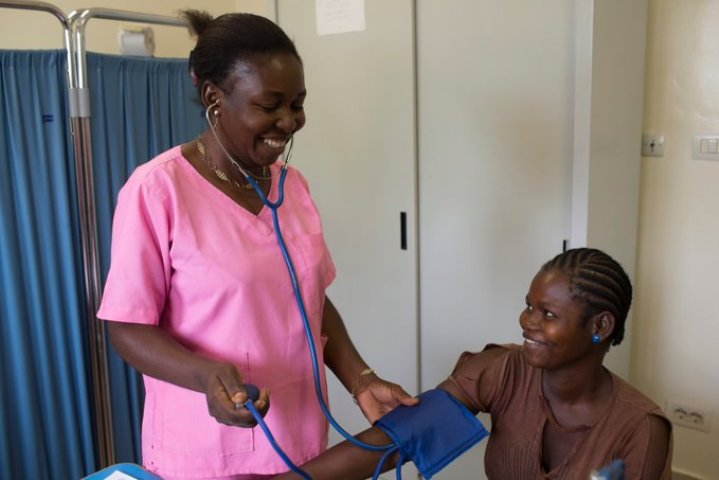WHO/UNICEF Report Warns Billions Still Lack Basics in Health Facilities
With only five years left to meet the 2030 deadline, WHO and UNICEF are urging governments, donors, and partners to act now, stressing that without accelerated action, billions will remain vulnerable in unsafe facilities.

A new joint report from the World Health Organization (WHO) and UNICEF has found that while more than 100 countries have made unprecedented efforts to improve basic services in health care facilities, billions of people are still treated in clinics and hospitals that lack essential infrastructure such as clean water, sanitation, hygiene, waste management, and reliable electricity.
The report, Essential Services for Quality Care: Water, Sanitation, Hygiene, Health Care Waste and Electricity Services in Health Care Facilities, warns that unless governments and international partners accelerate investment and action, the world will miss the 2030 global targets to provide safe, sustainable, and resilient health facilities for all.
A Critical Gap in Basic Services
The findings highlight the staggering global shortfall in essential services:
-
1.1 billion people were served by health care facilities without basic water services in 2023.
-
3 billion people lacked access to facilities with basic sanitation.
-
1.7 billion people were treated in facilities without basic hygiene services.
-
2.8 billion people relied on facilities without proper waste services.
-
Nearly 1 billion people received care in facilities with either no electricity (433 million) or only unreliable supply (478 million) in 2022.
These gaps severely undermine infection prevention and control, endanger patients, and hinder health workers’ ability to deliver essential care.
“Every patient deserves to receive care in a facility that is safe, hygienic, and properly equipped. Without reliable water, sanitation, hygiene, waste management, and electricity, health workers cannot prevent infections or provide essential services, putting millions of lives at risk,” said Dr Ruediger Krech, Director a.i., Department of Environment, Climate Change and Health at WHO.
Encouraging Progress and National Action
Despite the challenges, the report highlights progress in recent years:
-
101 countries in 2025 provided validated data on WASH, waste, and electricity—more than double the 47 countries in 2020.
-
Over 80% of countries have taken at least one national action, including developing standards, conducting baseline assessments, or drafting national roadmaps.
-
Several Least Developed Countries (LDCs) such as Ethiopia, Malawi, Nepal, Rwanda, and Uganda are demonstrating readiness to implement and scale-up improvements, showing that even resource-constrained nations can make important strides.
Financing: The Missing Piece
The report identifies funding as the greatest bottleneck. While more than half of the surveyed countries have approved national plans to strengthen health facility services, only one in five report having adequate dedicated financing for implementation. Without reliable funding, progress risks stalling despite strong political commitments and technical readiness.
A Global Call to Action
The report will be officially launched at a high-level meeting on 24 September at the United Nations in New York, convened by Hungary and the Philippines, co-chairs of the Group of Friends in Support of WASH in Health Care Facilities.
The event builds on the 2023 UN General Assembly Resolution (A/RES/78/130), which called for universal, sustainable access to water, sanitation, hygiene, waste, and electricity services in health care facilities. Governments, UN agencies, and international partners will come together to:
-
Accelerate implementation of national plans.
-
Close financing gaps through stronger international cooperation.
-
Ensure that every health facility worldwide provides the essential services needed for safe, quality, and dignified care.
Protecting Health and Building Resilient Systems
Experts emphasize that reliable WASH and electricity services are not only about improving patient safety—they are fundamental to resilient health systems, especially in the face of climate change and pandemics. Clean water, proper sanitation, and stable electricity are prerequisites for safe childbirth, surgery, vaccine storage, and emergency response.
With only five years left to meet the 2030 deadline, WHO and UNICEF are urging governments, donors, and partners to act now, stressing that without accelerated action, billions will remain vulnerable in unsafe facilities.
ALSO READ
Zaporizhzhia Nuclear Plant: Electricity Supply Challenges Amid Conflict
Germany's Bold Move: Electricity Grid Fees to Plummet by 57% in 2026
Heavy crowd surged towards electricity generator enclosure, later focus lights near that spot went off: TN govt on Karur stampede.
New WHO report maps global health literacy strategies to cut costs and reduce gaps










